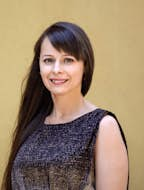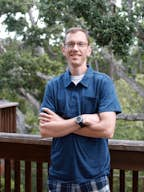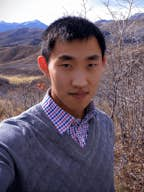Journey of the Universe: The Unfolding of Life
4.7
stars
379 ratings
•
105 reviews
 John Grim +1 more instructor
John Grim +1 more instructor Enroll for Free
Starts Jul 18
Financial aid available
23,953 already enrolled
Offered By

About
Instructors
Syllabus
Reviews
Enrollment Options
FAQ
About this Course
7,020 recent views
Journey of the Universe weaves together the discoveries of the evolutionary sciences together with humanities such as history, philosophy, art, and religion. The course draws on the Emmy-award winning film, Journey of the Universe, and the book from Yale University Press.
Journey explores cosmic evolution as a creative process based on connection, interdependence, and emergence. It examines a range of dynamic interactions in the unfolding of galaxies, Earth, life, and human communities. It investigates ways in which we understand evolutionary processes and the implications for humans and our ecological future. The Journey course, thus, is based on a new integration that is emerging from the dialogue of the sciences and humanities. Journey tells the story of evolution as an epic narrative, rather than as a series of facts separated by scientific disciplines. This changes our perception so that we begin to see ourselves as an integral part of this narrative. By situating ourselves within this story we can better appreciate the complexity and beauty of processes such as self-organizing dynamics, natural selection, emergence, symbiosis, and co-evolution. As we discover these intricate processes of evolution, we awaken to the beauty and complexity of our natural environment at this critical juncture in our planetary history.
Learner Career Outcomes
50%
started a new career after completing these courses
40%
got a tangible career benefit from this course
Flexible deadlines
Reset deadlines in accordance to your schedule.
Shareable Certificate
Earn a Certificate upon completion
100% online
Start instantly and learn at your own schedule.
Approx. 24 hours to complete
English
Subtitles: Arabic, French, Portuguese (European), Chinese (Simplified), Italian, Vietnamese, German, Russian, English, Spanish
Offered by

Yale University
For more than 300 years, Yale University has inspired the minds that inspire the world. Based in New Haven, Connecticut, Yale brings people and ideas together for positive impact around the globe. A research university that focuses on students and encourages learning as an essential way of life, Yale is a place for connection, creativity, and innovation among cultures and across disciplines.

The Specialization I took blew my mind. Each course was interesting, fun, and motivational, which encouraged me to continue learning.
— Lisa L.

Learning from leading scientists about what's going on in the field right now is so much different than the experience of reading a textbook.
— Peter W.

Without Coursera, it would be difficult for me to gain the skills I need to maintain a consistent pace of learning, especially while working full-time.
— Dapeng W.

The Specialization I took blew my mind. Each course was interesting, fun, and motivational, which encouraged me to continue learning.
— Lisa L.

Learning from leading scientists about what's going on in the field right now is so much different than the experience of reading a textbook.
— Peter W.

Without Coursera, it would be difficult for me to gain the skills I need to maintain a consistent pace of learning, especially while working full-time.
— Dapeng W.

The Specialization I took blew my mind. Each course was interesting, fun, and motivational, which encouraged me to continue learning.
— Lisa L.

Learning from leading scientists about what's going on in the field right now is so much different than the experience of reading a textbook.
— Peter W.

Without Coursera, it would be difficult for me to gain the skills I need to maintain a consistent pace of learning, especially while working full-time.
— Dapeng W.
1
2
3
People interested in this course also viewed
The Worldview of Thomas Berry: The Flourishing of the Ear…
Yale University
1 COURSE
Journey Conversations: Weaving Knowledge and Action
Yale University
1 COURSE
Syllabus - What you will learn from this course
Content Rating98%(5,833 ratings)
WEEK1
1 hour to complete
Welcome to Journey of the Universe: The Unfolding Life
Learn what this course is about, who's teaching it, and other ways you can explore this topic. Meet and greet your peers as well!
1 video (Total 11 min), 5 readingsSEE LESS
1 video
Tucker and Grim, “Cultural Cosmology and Scientific Cosmology”11m
5 readings
Course Description5m
Pre-Course Survey10m
Meet Your Instructional Team5m
Recommended Texts5m
Web Resources5m
5 hours to complete
Introduction - Beginning of the Universe
In module two, we explore how humans are part of the larger universe story.
5 videos (Total 90 min), 5 readings, 2 quizzesSEE LESS
5 videos
Tucker, “Living Within a Universe Story”16m
Tucker, “Ethics in an Age of Extinction”11m
Meet Brian Swimme1m
Journey of the Universe (full film)56m
The new cosmology — sketched out via Einstein — as a fundamental Copernican-type turning point4m
5 readings
Journey of the Universe Book: Chapter 1: Beginning of the Universe30m
"The New Story," by Thomas Berry30m
Scientific Summary, by Matthew Riley and Brian Thomas Swimme: Beginning of the Universe5m
Familiarize yourself with the Journey website30m
“Space Ripples Reveal Big Bang’s Smoking Gun”, by Dennis Overbye15m
2 practice exercises
Living Within a Universe Story30m
Introduction - Beginning of the Universe30m
WEEK2
4 hours to complete
The Formation of Galaxies and Stars
This module explores many of the world's greatest stories and how they begin with a journey, a quest to answer life's most intimate questions like where do we come from and why are we here?
5 videos (Total 20 min), 6 readings, 3 quizzesSEE LESS
5 videos
Journey of the Universe Film: Scene 1: Introduction3m
Journey of the Universe Film: Scene 2: Beginning of the Universe4m
Journey of the Universe Film: Scene 3a: Galaxies Forming1m
Journey of the Universe Film: Scene 3b: The Emanating Brilliance of Stars.3m
The Omnicentric Nature of Cosmic Expansion6m
6 readings
Journey of the Universe Book: Chapter 2: Galaxies Forming30m
American Museum of Natural History, NYC - Cosmology20m
Scientific Summary, by Matthew Riley and Brian Thomas Swimme: The Formation of Galaxies5m
Journey of the Universe Book: Chapter 3: The Emanating Brilliance of Stars30m
Short film, “Powers of Ten,” by Eames Office9m
Scientific Summary, by Matthew Riley and Brian Thomas Swimme: The Emanating Brialliance of Stars5m
3 practice exercises
Galaxies Forming30m
The Emanating Brilliance of Stars30m
The Formation of Galaxies and Stars30m
WEEK3
3 hours to complete
Our Solar System and Life’s Emergence
Here we look at several major milestones in scientific discovery that expanded our knowledge of the solar system
3 videos (Total 15 min), 5 readings, 3 quizzesSEE LESS
3 videos
Journey of the Universe Film: Scene 4: Birth of the Solar System3m
Journey of the Universe Film: Scene 5: Life’s Emergence5m
Plate Tectonics as Balanced Turbulence in Mars and Jupiter5m
5 readings
Journey of the Universe Book: Chapter 4: Birth of the Solar System30m
Scientific Summary, by Matthew Riley and Brian Thomas Swimme: Our Solar System5m
Scales of the Universe, American Museum of Natural History, NYC20m
Journey of the Universe Book: Chapter 5: Life’s Emergence30m
Scientific Summary, by Matthew Riley and Brian Thomas Swimme: Life’s Emergence5m
3 practice exercises
Our Solar System30m
Life's Emergence30m
Our Solar System and Life’s Emergence30m
WEEK4
4 hours to complete
Living and Dying and the Passion of Animals
Now we invite you to think about the coevolution of the human with other species within this broad time scale. Completing this module may change the way that you understand what it means to be human!
3 videos (Total 17 min), 6 readings, 3 quizzesSEE LESS
3 videos
Journey of the Universe Film: Scene 6: Learning, Living, and Dying11m
Journey of the Universe Film: Scene 7: The Passion of Animals2m
Demonstrating the Co-evolution Taking Place in Natural Selection2m
6 readings
Journey of the Universe Book: Chapter 6: Living and Dying30m
Field Museum, Chicago, Illinois – Evolving Planet10m
Scientific Summary, by Matthew Riley and Brian Thomas Swimme: Living and Dying5m
Journey of the Universe Book: Chapter 7: The Passion of Animals30m
Hall of Biodiversity, American Museum of Natural History, NYC10m
Scientific Summary, by Matthew Riley and Brian Thomas Swimme: the Passion of Animals5m
3 practice exercises
Learning, Living, and Dying30m
The Passion of Animals30m
Living and Dying and the Passion of Animals30m
Show More
Reviews
4.7
105 reviews
5 stars
81.31%
4 stars
12.63%
3 stars
3.94%
2 stars
0.78%
1 star
1.31%
TOP REVIEWS FROM JOURNEY OF THE UNIVERSE: THE UNFOLDING OF LIFE
by DSMay 5, 2020
Very, very insightful. Best course that I participated in. I simply loved it. And if you (the reader of this review) have any sort of curiosity regarding reasons of existence, this course is for you.
by DHOct 21, 2018
I love everything about this. Plan to go back sometime later and explore more of the websites and links that are referenced. I especially enjoy material from the American Museum of Natural History.
by ABSep 10, 2020
This course gave me a lot of lessons which I can really relate what is really happening around us and it also help me to freshen up the things that I've learned when I'm still studying!
by CSJan 15, 2017
This course is a must. There is just no other course that can nurture your spiritual yearnings within the framework of science. Take it. It's a wonderful course.View all reviews
====
Yale University
Video Transcript
We want to welcome you to this course because this is a 35 year project. It was 10 years actually even in making the film. But we want to give you some background to this course as we launch it this week. Philosophical and religious cosmology is the basic way that humans have oriented and grounded and nurtured and transformed themselves. If we take just orienting to the cosmos, we know we have powerful stories from indigenous peoples, but from Plato's Timaeus where the whole universe was seen as a living universe. And something like the Confucian cosmology of a triad of heaven, Earth and human was deeply inspiring for the peoples of East Asia, that humans completed the universe, the stars, and the galaxies and the Earth systems. But humans were very deeply connected to it. That's a cosmology of orienting to the cosmos in Confucianism. >> And human groundings. Similarly, we find these powerful stories in the Navajo Dineh traditions in southwest of the United States. The sense of four sacred mountains and how those four sacred mountains then appear literally as pilings of sand in the famous sand paintings connected with the chant ways. And the sand from these image to mountains is then rubbed on the patients. So the sense of embodying the placement in the grounded world throughout human history, then, this relationship with place and grounding in place is really very powerful.
>> Indeed, and as well these cosmologies gave humans away of nurturing with food and water both physically and symbolically. So all religious traditions have these great ceremonies of, for example, the Jewish tradition of the Seder gathering the family, breaking the bread, pouring this wine and sharing this meal. And very similarly, clearly in the Christian tradition, the Eucharist with bread and wine as central to a weekly ceremony, whether in the Mass or in other forms of Eucharistic bread-breaking. The Ramadan whole notion of fasting from food until the evening. And then at the very end of it, having a celebration that brings in the power of food and water to nurture the human in this long journey.
>> Yes, similarly, symbols of transformation or transforming through symbols in the religious traditions, just to consider the image of the sun. And that possibility of the illumination of the Sun in so many religious traditions. And connected then with this basic teaching again of emptiness. That the tranquility of the statues activates a transforming experience of emptiness.
>> Everywhere through Asia you look at the Buddhist statues and you feel that sense of liberation and of calm. So we come then to the Modern period and we have cosmology and the scientific revolution from the 16th century moving forward. And what we want to illustrate here, then, is there's a movement from an understanding of how we're oriented from a Cosmos to a Cosmogenesis, to change over time. And this is an exciting journey that we wanted to share here. We know it, but we need to draw it in for the power and the sense of challenge for the human.
>> And it's also appropriate to acknowledge that many cultural traditions, for example, the Navajo and Dineh they have a dynamic sense of the universe. But this transition in the scientific cosmology to, as you say, cosmogenesis or developmental time, is very interesting development, and very important for this Journey of the Universe project.
>> Exactly. So we begin with Copernicus, with this revolutionary discovery that the Earth is not the center of the universe, that the sun is. We're still trying to take that in in certain ways. We can say the Copernican revolution is the beginning of a new understanding of where we are in the cosmos, de-centering the Earth and the human.
>> And the multi-layered dimension. You can feel it very strongly in the story of Galileo Galilei who, again, ratchets forward this whole sense of developmental time by his observational work with telescopes that supported Copernicus' understanding of a sun-centered cosmology. And so Galileo moves forward that whole sense of observational empirical science.
>> And as we know, was very much challenged by the church on this. So the challenge to traditional cosmologies was enormous.
>> Yes. >> And it still is. And Galileo suffered house arrest for that. But Kepler as well was a person who wanted to understand how did planets move? What were these elliptical movements. So the laws of planetary movement that Kepler has contributed to our understanding of our solar system is astonishing, really.
>> And the sense of Kepler's attunement to a deep harmony in the universe affected people like Isaac Newton who, also his alchemical background, so deeply spiritual, one might say religious orientation, was hand in hand with an emerging sense of mathematical equations as providing insight into the workings of the universe. So that this sense of being able to formulate laws that allowed predictability gave rise after Newton to this new metaphor which stands in some tension with story. But it's a very interesting dynamic of the mechanical universe, so laws of a mechanical universe which Newton was able to put forward.
>> And then we move to the great revolution of the 19th century of Darwin, of the movement through time, but now geological time, Earth time, biological time. This notion that we are part of a changing earth system was stunning for humans to really begin to grasp the revolution of Evolution. And that is still something we're grappling with, and the tensions between religion and science over evolution are widespread in this country, although not necessarily in other parts of the world. But Darwin himself struggled with what does this mean for belief. What does it mean for a sense of a creator and so on. In this course we'll not certainly solve or resolve these kinds of tensions, but it will explore what it means for humans to situate themselves in a vast, evolving universe, with the physics of the early universe, and the systems from Copernicus onward to a sense of what is our role in the 13.8 billion year unfolding universe story.
>> One of the interesting stories in this regard is the person of Albert Einstein who's thought experiments also resonate with the imaginative quality of story And so Einstein was able to image himself into questions of the relationship of space-time, which had incredible ripple effect on our understanding of the world in the West. And so this emerging worldview associated with relativity, and brings Einstein even to the doorstep of the quantum world. And Einstein himself lived with the uncertainty of his own equations and his own work in terms of this emerging sense of a developmental world in flux.
>> And Einstein had a marvelous sense of the mystery and the vastness of what we were living in. And that sense, that challenge to all of us, well, it's much larger than we thought. Where do we fit in? For some, it gives a sense we're kind of very small in the cosmos. But we're trying to suggest no, this connects us to all of these emerging and unfolding processes. But we want to just come back to what's happening now for a search for an integrated story with all of the science now beginning to be absorbed by a much larger audience. And so we have from Ed Wilson at Harvard. He began this term actually Epic of Evolution recognizing that humans needed a way to feel a part of this. Cosmic Evolution is another term Eric Chaisson has been using, and teaches a course at Harvard on this. Its quite popular. Again, how humans can find their way to the future by understanding the past. And then we have a movement in history called Big History that David Christian from Australia has been leading. And he's trying to come at it from the historian's point of view and say we can't tell human history without the history of the universe and Earth. So this is also an exciting development. All of these are beginning to filter into both secondary and college education in North America and around the world. And once again, this is how Universe Story fits into a larger discussion of a story. This, again, is the 1992 version. And then almost 20 years later we have brought forward this Journey of the Universe and integrating story. And our hope is to join together in conversation, science and humanities. So we welcome you to this course and we're delighted to be on the journey of journey with you all. [MUSIC]
====
====
